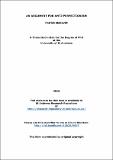Files in this item
An argument for anti-perfectionism
Item metadata
| dc.contributor.advisor | Hope, Simon | |
| dc.contributor.author | McDevitt, Patrick | |
| dc.coverage.spatial | 179 p. | en_US |
| dc.date.accessioned | 2016-06-17T11:19:24Z | |
| dc.date.available | 2016-06-17T11:19:24Z | |
| dc.date.issued | 2016-06-23 | |
| dc.identifier | uk.bl.ethos.6870 | |
| dc.identifier.uri | https://hdl.handle.net/10023/9007 | |
| dc.description.abstract | In political philosophy, perfectionism is the view that it is the job of the state to best enable its citizens to live good or flourishing lives. It claims that certain lives can be judged to be sound, and thus instructs governments to promote those lives using state institutions etc. Anti-perfectionism denies this. It says that it is not the job of the state to promote good lives. Instead it should restrict itself to securing basic rights and duties, a threshold level of resources and so on. Citizens should be left to adopt pursuits however they see fit. For some anti-perfectionists, this is precisely because we cannot judge any putative life to be sound. However, many are not sceptics, and justify state neutrality for other reasons. All accounts of anti-perfectionism must overcome what has been called the asymmetry objection: what justifies the imbalance inherent in anti-perfectionism? Why believe that the state is permitted to act on judgements about justice, but not on judgements about flourishing? My thesis argues that attempts to respond to the asymmetry objection have failed thus far. Further, I offer an account of political morality that can overcome the problem. The first four chapters of the thesis clarify the debate between perfectionists and anti-perfectionists, narrowing the former down into its most plausible form. Chapters five and six focus on two failed attempts to vindicate anti-perfectionism – Brian Barry’s argument from scepticism and Jonathan Quong’s Rawlsian approach. In the final chapter I put forward a much more promising argument in favour of anti-perfectionism – justice as a set of constraints. | en_US |
| dc.language.iso | en | en_US |
| dc.publisher | University of St Andrews | |
| dc.subject | Philosophy | en_US |
| dc.subject | Political philosophy | en_US |
| dc.subject | Ethics | en_US |
| dc.subject | Justice | en_US |
| dc.subject | Perfectionism | en_US |
| dc.subject | Anti-perfectionism | en_US |
| dc.subject | Neutrality | en_US |
| dc.subject | Human flourishing | en_US |
| dc.subject | Joseph Raz | en_US |
| dc.subject.lcc | JA79.M34 | |
| dc.subject.lcsh | Political ethics | en_US |
| dc.subject.lcsh | Liberalism | en_US |
| dc.subject.lcsh | Autonomy (Philosophy) | en_US |
| dc.subject.lcsh | Justice (Philosophy) | en_US |
| dc.subject.lcsh | Political science--Philosophy | en_US |
| dc.title | An argument for anti-perfectionism | en_US |
| dc.type | Thesis | en_US |
| dc.contributor.sponsor | Arts and Humanities Research Council (AHRC) | en_US |
| dc.type.qualificationlevel | Doctoral | en_US |
| dc.type.qualificationname | PhD Doctor of Philosophy | en_US |
| dc.publisher.institution | The University of St Andrews | en_US |
| dc.publisher.department | University of Stirling | en_US |
This item appears in the following Collection(s)
Items in the St Andrews Research Repository are protected by copyright, with all rights reserved, unless otherwise indicated.

